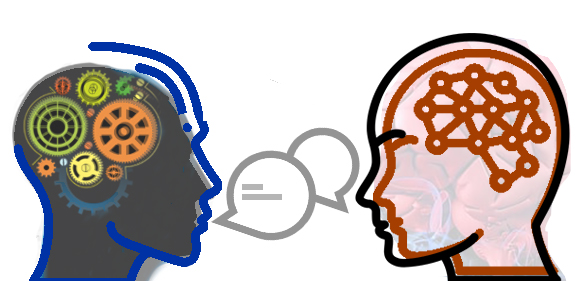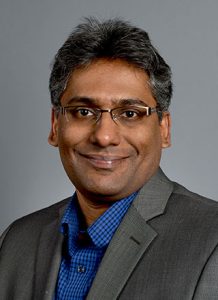May 29, 2020

Vidura, an AI advisor, will connect human inquiries to mass amounts of data.
Want your smartphone to find a restaurant? No problem. Want artificial intelligence to help you plan a healthy diet on a grocery budget of $400 a month? You’re on your own.
But research around artificial intelligence happening at Mizzou Engineering may change that. Associate Professor Prasad Calyam and his students from Electrical Engineering and Computer Science are developing an AI advisor that could help smartphones talk you through the tough questions.

Calyam
“The fact is AI can be adapted to do much more than Alexa and Siri, which provide single short recommendations today,” Calyam said. “Ask a simple question and it can usually give a helpful answer. But you can’t have an intelligent conversation or seek expert advice. In the real world, we want a conversational advisor. We want an agent to help us sort through vast amounts of data that’s out there and provide us with knowledge we can use.”
Enter Vidura
Vidura is an advanced chatbot that sifts through information to provide answers to complex questions. And if Vidura doesn’t know an answer, it will find a qualified expert who does.
Calyam recently received National Science Foundation funding to develop technology to power Vidura. For the early investigations, he is implementing the technology for Professor Satish S Nair’s science gateway. The gateway, CyNeuro, serves neuroscience researchers and educators.
In its early development, Vidura will give Nair and his students a way to find answers among existing information. It will extract data from journal articles, scholarly works and other academic resources.
The team is equipping Vidura with the ability to ask follow-up questions. If someone asks the chatbot for information about neurons, for instance, Vidura may ask for more details. By adding keywords such as “single cell,” the system can provide narrower, more applicable results.
Vidura can profile a user to determine the level of expertise. If the bot knows a subject matter expert is asking a question, it will take the question at face value. If a novice is asking, Vidura may ask for additional information to ensure it understands the user’s intent.
To ensure Vidura factors in human-computer interaction, the team recruited Kerk Kee. Kee is an associate professor at Texas Tech University.
“He will look at the social science side and help us understand how the chatbot can create the impact we want on users,” Calyam said. “He’ll help find the human side of the technology.”
A smart tool that asks for help
Vidura is also unique in that it can connect users to experts. These scholars can provide insights when information is not available in existing databases. The chatbot can seek out these scholars to fill in knowledge gaps.
“For a given question to answer a complex problem that requires multi-disciplinary expertise, we identify experts,” Calyam said. “These are people who have published leading research funded by federal agencies to work on cutting-edge ideas.”
While Vidura aims to help science and research, the goal is to bring the technology to the masses.
Current chatbots that rely on human interaction could become more autonomous in the future. AI like Siri and Alexa could answer complicated requests to help, for example, a farmer or an attorney. And it could transform industries by allowing AI to answer more complex questions with a single voice command.
“We’re already seeing chatbots used in retail but for science or industry fields such as agriculture or law, where we need more complex knowledge discovery, the use of chatbots is not well understood,” he said.
About “Vidura”
The name Vidura was inspired by episodes from the ancient Indian epic of Mahabharata. The emperor there, Dhritarashtra, had collected all knowledge known to man. He was also blind.
Vidura served as the emperor’s advisor. In the event Dhritarashtra would need to make a political or judicial decision, he would call on Vidura to find answers.
The advisor would then scour libraries and scrolls for guidance. When answers weren’t clear, Vidura would call on scholars.
In many ways, organizations are blind, Calyam said. Hospitals, for instance, have massive amounts of patient information and access to journals. However, they struggle to extract details to improve healthcare based on data patterns and the latest advances.
“There is so much data but when we don’t know what’s in the data, we’re blind,” he said. “This is what we are doing in our Vidura chatbot project. We are developing new retrieval-based and generative machine learning algorithms to create a usable AI advisor. We want to mine existing, relevant knowledge patterns to make wise recommendations for decision makers.”
“Decision maker who understands quickly, pursues valuable objects with patient judgment, wastes not breathe on unproductive affairs; possess foremost mark of wisdom truly” – Mahatma Vidura, BC